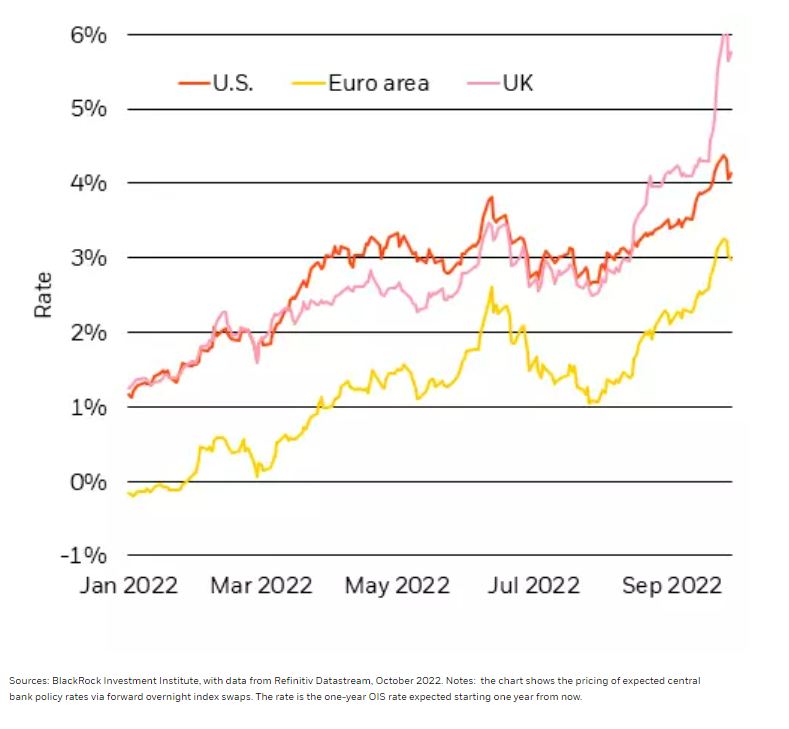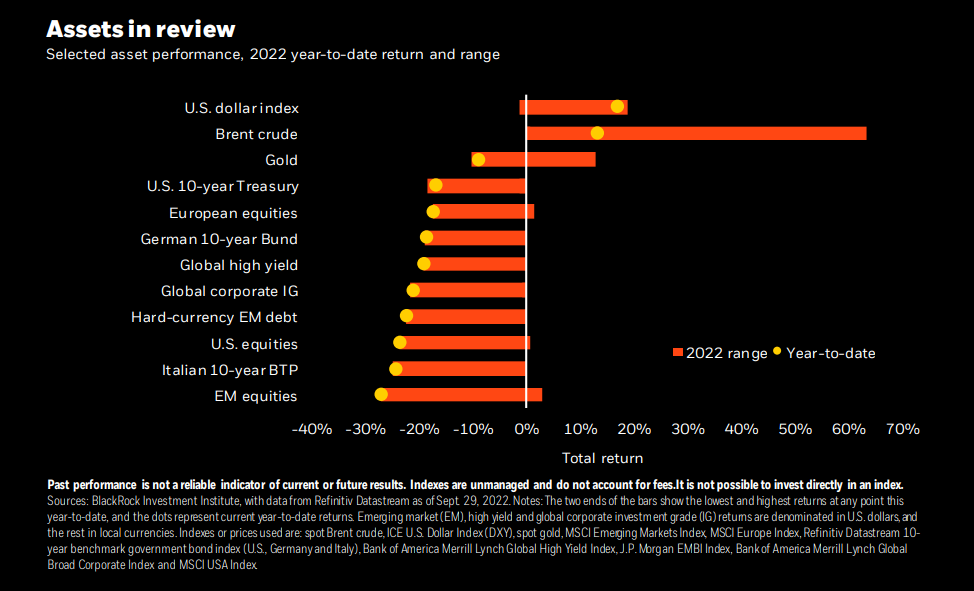Jean Boivin, Head of the BlackRock Investment Institute, together with Wei Li, Global Chief Investment Strategist, Alex Brazier, Deputy Head, and Vivek Paul, Head of Portfolio Researcb, all forming part of the BlackRock Investment Institute, share their insights on global economy, markets and geopolitics. Their views are theirs alone and are not intended to be construed as investment advice.
Key Points
Dialed-down risk: The new regime poses an unavoidable trade-off for central banks: tame inflation by hiking or preserve growth. We see them overtightening rates so keep risk low.
Market backdrop: UK gilt yields reached 14-year highs before the Bank of England intervened to halt the selloff. Yields on 10-year U.S. treasuries topped 4%, a first since 2010.
Week ahead: The U.S. jobs report will be a key gauge of whether labor force participation is increasing. ISM manufacturing data should give perspective on recession risks.
We’ve said a period of steady growth and inflation known as the Great Moderation is over – and made this central to our investment views. Central banks face a brutal trade-off in this new regime: either live with inflation or the economic damage needed to tame it quickly. There’s no way around this, or no “soft landing,” in our view. Case in point: the UK’s fiscal splurge. It didn’t push up growth expectations; it only resulted in higher rates. We stick with dialed-down risk.
UK rates surge as policy forces clash
Market pricing of future policy rates, 2022

The trade-off central banks face in a regime of heightened macro volatility and a world shaped by production constraints came into sharper focus last week. Fiscal authorities in the UK tried to boost growth with unfunded tax cuts and spending increases. Markets shook. Rate expectations for the Bank of England surged above other major central banks (see pink line in chart). Growth expectations did not – the pound plummeted to all-time lows and stocks fell. This all shows how we are in a new regime, where authorities can’t spend to avoid recession. We think getting inflation down quickly would take aggressive rate hikes and recession. Central banks are trying to do whatever it takes to tame inflation, but they haven’t acknowledged what it will take, in our view. We expect them to break growth as a result, but then stop in 2023 once the economic damage is clear.
The macro picture has worsened as a result. We expect recessions in major developed markets (DM). That could be next year in the U.S. but sooner and deeper in the euro area given the energy crunch. Central banks prioritizing the pressure to bring inflation down quickly over the economic implications implies deeper recessions overall, in our view.
Our short-term views
This is why we stick with reduced risk taking in our tactical investment views. We’re looking for the least bad options. We’re underweight DM equities. Stocks have yet to fully price in recession fears and higher rates, in our view. We think earnings expectations also seem optimistic. An energy crisis further dampens our view of European stocks. Japan is different – still easy monetary policy keeps us neutral. Valuation remains an important signpost for us to consider getting more positive on stocks. Relatively attractive valuations are also why we prefer credit over stocks. Higher yields and strong balance sheets suggest to us investment grade credit is better placed than equities to weather recessions.
We’re underweight DM bonds because we think inflation will persist above central bank targets after hiking stops. That said, we see some value in the shorter maturities because of the safety they provide as the closest cash-like investment. Persistent inflation also underpins our overweight on inflation-linked bonds. We’re overweight emerging market (EM) debt. Central banks are well ahead of others in their cycles. EM currencies have also held up fairly well in the risk-off environment. But we remain wary of the currency outlook as some central banks in EM have paused their tightening as growth deteriorates.
Looking at the long term
Strategic positioning is shaped by our view that central banks will stop hiking next year and not go as far as necessary to get inflation back to target quickly. Recent events reinforce our conviction they will halt rate hikes and live with inflation once confronted with economic damage – either in the form of recession or cracks in financial stability, or both. This will be more favorable to equity than bonds – so we’re overweight DM stocks. We prefer public to private equity. Inflation will persist, so we prefer inflation-linked bonds to nominal bonds. We’re overweight public credit on attractive valuations and income potential.
Our bottom line
We stick with reduced risk taking, tactically. Heightened macro volatility in a new regime creates stark trade-offs for central banks at risk of overtightening into recessions. Tactically, that means we prefer credit over stocks. Equities remain relatively attractive alongside credit longer term. Persistent inflation keeps us negative on nominal bonds and positive on inflation-linked bonds now and even more so further out into our strategic investment horizon.
Market backdrop
UK gilt yields eased from 14-year highs and the pound clawed back from all-time lows after the surprise government fiscal splurge forced the Bank of England to temporarily buy long-term bonds to stabilize yields. The events illustrate the sharp trade-off policymakers face on higher inflation – and the potential financial dislocations from higher rates. We see risks of central banks overtightening into recessions. U.S. 10-year Treasury yields briefly topped 4% and equities hit fresh lows.
The key release this week is the U.S. jobs report. A rapid pace of job gains has not disguised the fact that the overall level of labor supply remains low compared to pre-Covid – a key production constraint that’s driving inflation higher, in our view. Survey data have softened over the past year. ISM manufacturing data should give more perspective on recession risk.

Week Ahead
October 3: U.S. ISM manufacturing PMI
October 6: India services PMI
October 7: U.S. payrolls report
October 8: China Caixin services PMI
BlackRock’s Key risks & Disclaimers:
This material is not intended to be relied upon as a forecast, research or investment advice, and is not a recommendation, offer or solicitation to buy or sell any securities or to adopt any investment strategy. The opinions expressed are as of 26th September, 2022 and may change. The information and opinions are derived from proprietary and non-proprietary sources deemed by BlackRock to be reliable, are not necessarily all-inclusive and are not guaranteed as to accuracy. As such, no warranty of accuracy or reliability is given and no responsibility arising in any other way for errors and omissions (including responsibility to any person by reason of negligence) is accepted by BlackRock, its officers, employees or agents. This material may contain ’forward looking’ information that is not purely historical in nature. Such information may include, among other things, projections and forecasts. There is no guarantee that any forecasts made will come to pass. Reliance upon information in this material is at the sole discretion of the reader.
The information provided here is neither tax nor legal advice. Investors should speak to their tax professional for specific information regarding their tax situation. Investment involves risk including possible loss of principal. International investing involves risks, including risks related to foreign currency, limited liquidity, less government regulation, and the possibility of substantial volatility due to adverse political, economic or other developments. These risks are often heightened for investments in emerging/developing markets or smaller capital markets.
Issued by BlackRock Investment Management (UK) Limited, authorized and regulated by the Financial Conduct Authority. Registered office: 12 Throgmorton Avenue, London, EC2N 2DL.
MeDirect Disclaimers:
This information has been accurately reproduced, as received from BlackRock Investment Management (UK) Limited. No information has been omitted which would render the reproduced information inaccurate or misleading. This information is being distributed by MeDirect Bank (Malta) plc to its customers. The information contained in this document is for general information purposes only and is not intended to provide legal or other professional advice nor does it commit MeDirect Bank (Malta) plc to any obligation whatsoever. The information available in this document is not intended to be a suggestion, recommendation or solicitation to buy, hold or sell, any securities and is not guaranteed as to accuracy or completeness.
The financial instruments discussed in the document may not be suitable for all investors and investors must make their own informed decisions and seek their own advice regarding the appropriateness of investing in financial instruments or implementing strategies discussed herein.
If you invest in this product you may lose some or all of the money you invest. The value of your investment may go down as well as up. A commission or sales fee may be charged at the time of the initial purchase for an investment. Any income you get from this investment may go down as well as up. This product may be affected by changes in currency exchange rate movements thereby affecting your investment return therefrom. The performance figures quoted refer to the past and past performance is not a guarantee of future performance or a reliable guide to future performance. Any decision to invest in a mutual fund should always be based upon the details contained in the Prospectus and Key Investor Information Document (KIID), which may be obtained from MeDirect Bank (Malta) plc.





